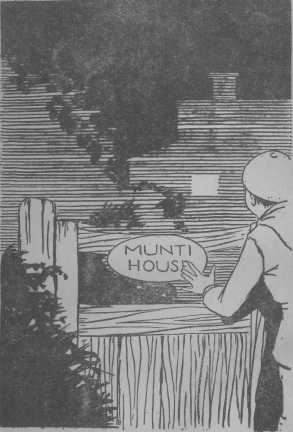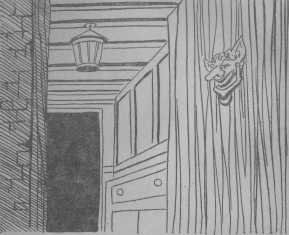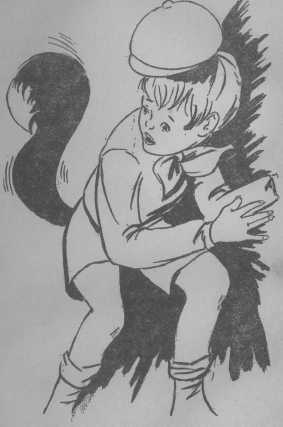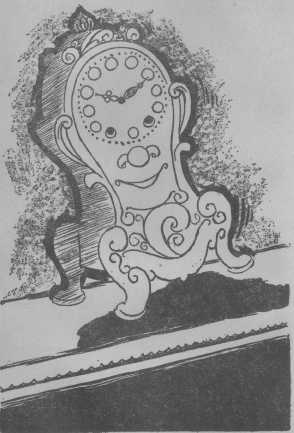Anytime Tales (4 page)

“I’m not in a dream, I know that,” said William. “I’ve just come from the Cub Meeting, and I’m walking home in rather a thick fog. And I’m on the right way. I’m not lost. I just can’t seem to find the end of this road.”
It was no use. He couldn’t find it. No matter if he went up or down, there seemed no end and no beginning.
“This is absolutely silly,” said William at last. “There’s no sense in it. I shall go into one of these houses and ask my way.”
He flashed his torch on the gate of the nearest house. He saw the name there, “
MUNTI
HOUSE”.
He went up the little path and came to the front door. It had a peculiar knocker in the shape of a man’s head. The head had pointed ears and a wide grin. William knocked on the door with it.

The door opened, and a dim light shone out from the hall. “Please,” began William, “could you tell me-----”
Then he stopped. Nobody was there. There was just the open door and the dark hall and nothing else. How peculiar! William peered inside.
A curious whistling noise came up the hall, like the wind makes in the chimney. “Well,” said William, “if someone is whistling, someone is at home. I’ll go in.”
So in he went and the door shut softly behind him. He walked up the hall and came to a room without a door. Someone was whistling there. The whistling stopped. “Come in, come in,” said a high little voice. “What do you want, William?”
William jumped. How did anyone in that house know his name? He looked round the room in surprise.

A plump little man with pointed ears and remarkably green eyes was sitting in a rocking-chair by an enormous fire. Rockity-rock, he went, rockity-rock. He looked at William and grinned.
“Why,” said William, “you are exactly like the knocker on your door!”
“I know,” said the little man. “Why shouldn’t I be? Your name’s William, isn’t it? I’m Mr. Munti, of Munti House.”
“How do you know my name’s William?” asked William.
“Well, I just took one look at you and I knew your name must be William,” said Mr. Munti, rocking furiously. “That’s easy.”

It didn’t seem easy to William. He stared at Mr. Munti, who stared back. “I came to ask if you could . . .” began William, but he was interrupted by a large black cat with eyes as green as
Mr.
Munti’s.
“MEEEE-ow,” said the cat, walking into the room and patting Mr. Munti on the knee. “MEEEE-ow!”
“Hungry, are you?” said Mr. Munti. “Pour, jug, pour!”
There was a pint milk-jug on the table, and, on the floor below, a large saucer. The jug solemnly tipped itself and poured milk into the saucer below.
“Good, jug, good,” said Mr. Munti, rocking away hard. “You didn’t spill a drop that time. You’re getting better.”
William stared in surprise. What a peculiar jug! He looked at Mr. Munti. “I say,” he said, “are you a conjurer?”
“No,” said Mr. Munti. “Are you?”
“No,” said William. “I’m a little boy.”
“Don’t believe in them,” said Mr. Munti, and he gave a sudden high chuckle like a blackbird. “I never did believe in little boys.”
William was astonished. “But you
must
believe in them,” he said. “I’ve just been to a Cub Meeting. I’m a Cub, and I…”
“There you are!” said Mr. Munti grinning. “You’re a Cub. You’re not a little boy. What sort of Cub are you! I believe you’re a fox-cub. You’ve got such a nice bushy tail.”
William felt something swishing behind him and looked round. To his enormous astonishment he saw that a fine bushy tail hung down behind him. He turned round to see it properly—and the tail turned with him. He felt it—good gracious, it seemed to be growing on him, right through his shorts!

“MEEEE-ow,” said the cat again and patted the little man on the knee.
“What! Still hungry?” said Mr. Munti. “I never knew such a cat! There’s a kipper in the cupboard for you.”
The cat went to the cupboard door, stood on his hind legs and opened it. He sniffed inside the cupboard, put in his paw and pulled out a kipper. It landed on the floor.
“Shut the door, Greeny, shut it,” ordered Mr. Munti. The cat blinked at him with deep green eyes and carefully shut the cupboard door. Then he began to eat his kipper.
William stared, open-mouthed, forgetting his tail for the moment. What a very clever cat!
“Well?” said Mr. Munti, rocking away hard. “Did you say your were a fox-cub? Or perhaps you are a bear-cub? I see you have nice hairy paws.”
William looked at his hands in horror. Whatever was the matter with him? He had big hairy paws now, instead of hands. He hid them in his pockets at once, full of dismay. What
was
happening? What was this little man with the bright green eyes?
“No—on the whole, I think you must be a lion-cub,” said Mr. Munti, peering at him. “I never in my life have seen such wonderful whiskers. Magnificent.
Aren’t they, Greeny? Even better than yours.”
“MEEEE-ow,” said Greeny, and began washing himself very thoroughly.
William felt his face in alarm. Goodness gracious, there were long strong whiskers growing from his cheeks—how very peculiar he must look! His paw brushed against his face, a furry, soft paddy-paw, just like a bear’s.
“Please, sir,” said William, beginning to feel scared, “I want to go home. I’m not a lion-cub, or a bear-cub, or a fox-cub—I’m a little boy Cub, a sort of Scout.”
“I told you, I don’t believe in little boys,” said Mr. Munti. “So I don’t believe in your home either. I don’t believe you want to go there because there isn’t one, and I don’t believe in
you.
Do you believe in me?”
“Well—what are you?” asked William, desperately.
“My mother was a pixie and my father was a brownie,” said Mr. Munti, rocking away.
“Then I don’t believe in you,” said poor William. “I don’t believe in fairies, or pixies, or brownies, or dragons, or giants, or …”
“And I don’t believe in little boys, so we’re quits,” said Mr. Munti, with a wide grin.
“Ding-dong,” said the clock loudly, and danced all the way down to the end of the mantelpiece and back again.
“Will you stop that?” said Mr. Munti fiercely to the clock. “How often must I tell you that well-behaved clocks don’t caper about like that?”
William began to feel bewildered. His tail waved about behind him. He could feel it quite well. His hairy paws were deep in his pockets. He could feel the whiskers on his cheeks.
WHAT
was happening? He didn’t believe in any of it, but it was happening all right—and happening to him.

“I’m going out of this peculiar house,” said William suddenly, and he turned to go.
“You might say good-bye,” said Mr. Munti, rocking tremendously hard and almost tipping over.
“Goodbye, Mr. Munti,” said William.
“MEEEE-ow,” said the cat, and came with him to the front door. The cat stood up and opened the door politely. William went out into the darkness and the fog. The door shut. He shone his torch on the knocker head, and then on the name of the house on the front gate—”
MUNTI
HOUSE
.” Who
was
Mr. Munti really? Was he,
could
he be a conjurer? Conjurers did do peculiar things. But that cat, too—and the jug— and the clock!
“I shall certainly come back tomorrow and see Mr. Munti again, in the daylight,” said William to himself. He went down the road, hoping that he would find the end of it this time. And to his great delight, he did. The fog began to clear a little, and he could see his way.
“Turn to the left—then over the crossing—and straight home!” said William, in delight. “Oh dear— what in the world will Mother say when I arrive home with a tail and furry paws and whiskers?”
She didn’t say anything—because when William thankfully walked in his tail had gone, his hands were his own again, and there were no whiskers left. And
what was more, his mother wouldn’t believe a word of his tale!
“Fancy
you
making up such a silly story!” she said. “You’re very late, William—and you needn’t tell me a lot of fairy-tales like that. Just tell the truth.”
Now, the next day, as you can imagine, William went off to Ash Tree Avenue to look for Munti House, and the queer knocker on the door, and Mr. Munti himself. And will you believe it, though he looked at every single house in the avenue at least three times, not one was called Munti House, and not one had a knocker in the shape of a grinning head.
Poor William was terribly puzzled. He told his story to several people, but nobody believed him at all. “How
can
you make up such a story when you’ve always said you don’t believe in things like that?” said Mary Jane.
He told it to me. That’s how I know about it. “I’ve no tail left, of course,” said William, “but see, there are a few little hairs still on my hands, and there’s a place here on my left cheek that feels a bit like a whisker growing. Do, do tell me what you think about it, please?”
Well, I don’t know what to think! What do
you
think about it all?
I wonder if you ever knew Interfering Ina? She was a little girl about eight years old, quite pretty, quite clever—but, oh dear, how she did interfere with all the other children!
If she saw two or three of them playing a game together she would go and poke her nose into the game and say, “Oh, you are not playing that quite right! Look, you should play it
this
way!”
